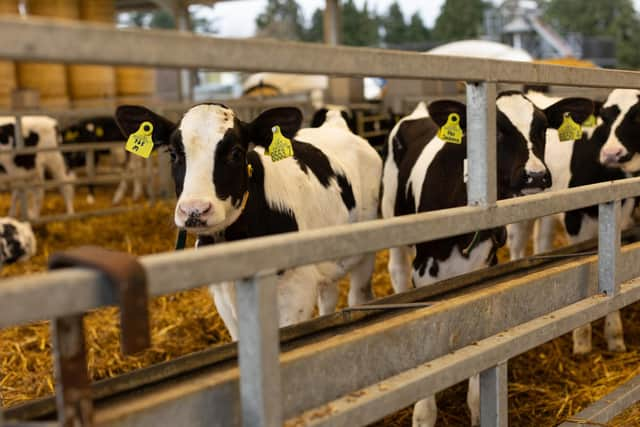February brings a flurry of activity on local farms
and live on Freeview channel 276
“With the slurry ban lifted this month, it’s only right that we focus on farm safety. Despite the regular warnings from the Health and Safety Executive, every year we hear of terrible tragedies and near misses on farms linked to slurry mixing or open tanks.
“Fatigue from long days and late nights attending to cows calving or a busy lambing season, may sometimes lead to poor judgement when it comes to managing slurry on farms.
Advertisement
Advertisement
“Where slurry is held, gas is always present - methane, carbon monoxide, ammonia and hydrogen sulphide, all of which can create a risk to human and animal health. When agitated or mixed, it will give off higher levels of gas which can linger for up to 30 minutes in that area.


“At low levels hydrogen sulphide gives off a distinctive odour of rotten eggs, however at high concentrations you cannot smell it and a fatal exposure can happen quickly and without warning.”
The Health and Safety Executive advice is to:
- Work on a breezy day or have some other effective method of safely venting slurry gas away from the working area;
- Ensure everyone on the farm knows what you are doing and understands the dangers
Advertisement
Advertisement
- Prevent risk to other workers, family members (including children), contractors or delivery drivers. Warning signs can help;
- Move your livestock out of slatted buildings or buildings incorporating slurry storage facilities;
- No one should stand over mixing points, reception pits or other areas where gas may be emitted - even if they are outdoor.
- Cover mixing points and reception pits in case someone is overcome and falls in;
Advertisement
Advertisement
- No naked flames e.g. cigarette as some slurry gases are flammable
- Never enter a slurry tank or slurry storage system unless you are equipped, trained and competent to use air-fed respiratory protective equipment.
- Make sure open tanks or access points are not accessible by children or anyone who does not have permission to be in the area.
- Slurry stores should be checked and maintained regularly by specialist contactors who are fully trained and equipped.
Advertisement
Advertisement
Richard explains: “From an insurance perspective, it’s very important that you have Public Liability and Employers Liability in place to cover any potential claims from visitors and helpers brought in to help with extra farm work if you are mixing or handling slurry - and if you use a specialist agricultural contactor you should check that they have public liability insurance in place.
“AbbeyAutoline can also arrange Personal Accident cover for farmers as part of their farm insurance policy. This cover can provide a lump sum payment in the event of accidental death, loss of limb, loss of sight, loss of hearing or permanent total disablement and can also provide a weekly benefit for temporary total disablement and temporary partial disablement. Cover can be extended to include illness as well. (Premium is based on the age of the client, previous medical history and the level of cover required)
“Another issue to consider would be slurry tankers moving on the road – they should carry warning beacons to highlight a slow moving agri vehicle and ensure all warning and indicator lights are in good working order. We have had incidents reported previously where road users have attempted to overtake a right turning tanker, only to drive into the side of the tractor. I’d urge drivers to be cautious and farmers to ensure tankers and tractors have appropriate warning lights.”
With lambing season underway and new calves due this month, February means there’s lots of jobs to be done on farms.
Advertisement
Advertisement
“For some people, long winter nights, interrupted sleep and a lengthy ‘to do’ list may contribute to low mood, feeling isolated, stressed or even anxious. It’s important to talk to a friend, family member or organisations like Rural Support if you are feeling overwhelmed,” Richard adds.
“While it can be a very busy time for farmers, there is a sense of joy and a nod in the direction of spring when you see the fields filled with frolicking lambs. New lambs mean the Spring Equinox is just around the corner and brighter, longer days are just weeks away.”
Contact the Farm Team at AbbeyAutoline, 08000 66 55 44 or visit https://www.abbeyautoline.co.uk/farm-insurance